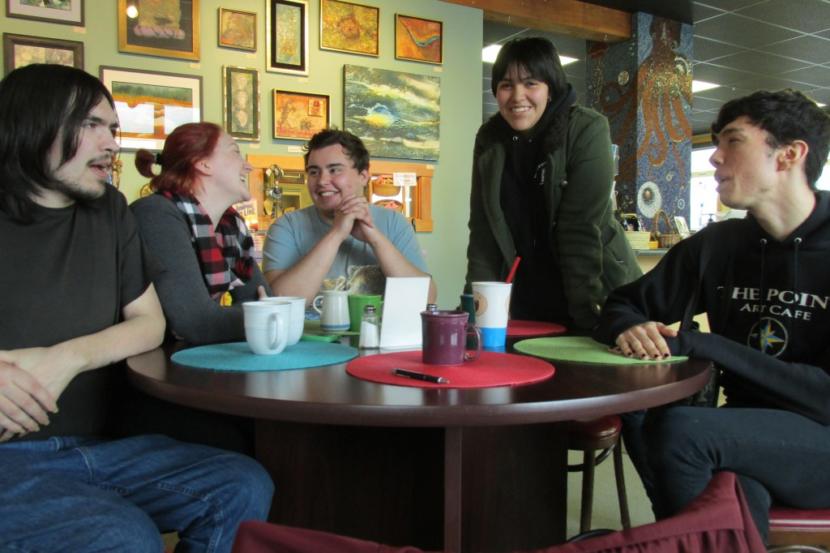
In October 2014, KRBD interviewed the group Transgendered Ketchikan. Five years later, KRBD follows up to learn whether anything has changed.
Transgendered Ketchikan is a closed Facebook group started by two people for those transitioning and their supporters. Members such as Sheen Davis used to meet for coffee on Fridays.
Davis came to Ketchikan 40 years ago to work in the timber industry and later worked as a local firefighter and first responder. She came out in 2012.
“For each person it’s different whenever they come out,” said Davis. “And for me it was you know, slow feeling the waters, and then I guess you get to a point where you really don’t care if you walk on egg shells and they break. You just get to the point where you’re done.”
After a 25 year career, Davis retired from firefighting. She said most of her everyday coworkers were okay with her transition, but not everyone.
“Public safety, to be successful, is generally a type-A personality,” said Davis. “And anybody who has a feminine side is really not considered type-A, even though they have good decision making skills.”
Along with physically transitioning, Davis also changed her name. Though she’s not angry when people call her by her former first name.
“Actually I feel kinda sympathetic because this person obviously doesn’t know me,” Davis said. “I haven’t used that name for seven years, and legally for three, so my name has changed. I guess I feel sorry because I should have kept in contact with this person a little bit more. I just tell them, ‘hey, a few things have changed.’”
In her previous KRBD interview, Davis said she only felt 75% comfortable being out, because of verbal and physical abuse. Since then, she says she hasn’t faced any discrimination that she’s noticed or cares about.
“This is me, this is my skin,” said Davis. “What other people think is really none of my business.”
Though that doesn’t mean things are necessarily better.
I asked, “So in your opinion, do you think people have become more accepting?”
“No,” said Davis.
Davis said her age group of friends are over their 40s and 50s. She believes older generations tend to not be as accepting because of the way they were raised.
“If you’re preprogrammed as a child there’s men, there’s women,” said Davis. “They have kids, they have boys and they have girls. ‘Oh, this boy’s gonna be a lady killer when he grows up. Or oh, she’s gonna be a princess and break a lot of hearts when she grows up.’ We probably all had it to a certain extent. It’s not their fault, it’s basically one of those muscle memory things.”
Dawn Schlosser is a creator of the group Ketchikan Pride Alliance. She said more acceptance, or even tolerance, of the LGBTQ community would be helpful. Schlosser said symbols of safety can be as infectious as those that spread intolerance.
“Any organization that wants to have a tiny little rainbow somewhere to say that we’re safe, and mean it, is not just a drop in the bucket—that’s huge,” Schlosser said. “That’s, if I’m holding my girlfriend’s hand, I’m not gonna get kicked out of this place. That’s not a small thing, especially to someone who’s newly out and feeling vulnerable.”
Though Transgendered Ketchikan hasn’t been as active lately, Schlosser said the group was a resource for her, even as a lesbian.
“When all of you wonderful people were getting together regularly, and it was just a space, even though it wasn’t specifically my space, it wasn’t a lesbian space—it was still a space,” said Schlosser. “It was safe, it was open, it was without the confines of expected gender scripts and orientation scripts and it was huge for me.”
Davis had advice for those who may be struggling to accept themselves due to the judgement of others.
“Walk in like you own the place. It’s easy to say and even harder to do. Walk in like you own the place,” said Davis.
For Schlosser, she said not internalizing a negative reaction can make all the difference.
“Going, this is something wrong with that person and their thinking,” said Schlosser. “This is not something wrong with who I am or what I’m doing. That is like a cultivated, psychological distance that we have to come to and it is hard to come to, but I think that was probably one of the most crucial steps with me, especially with my family.”
